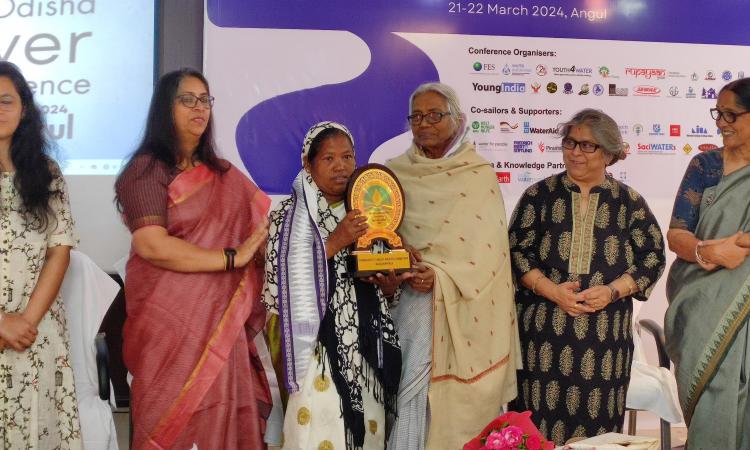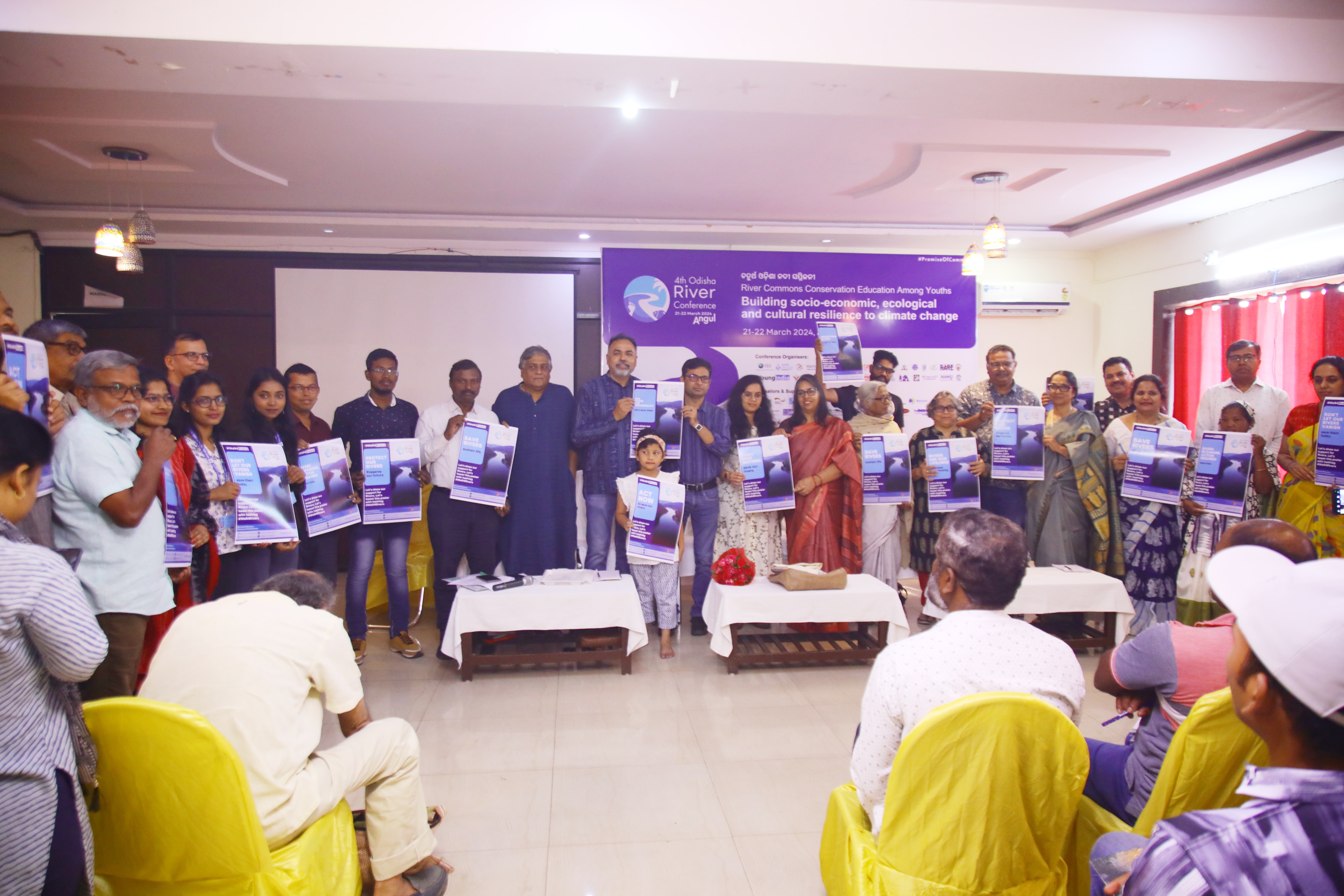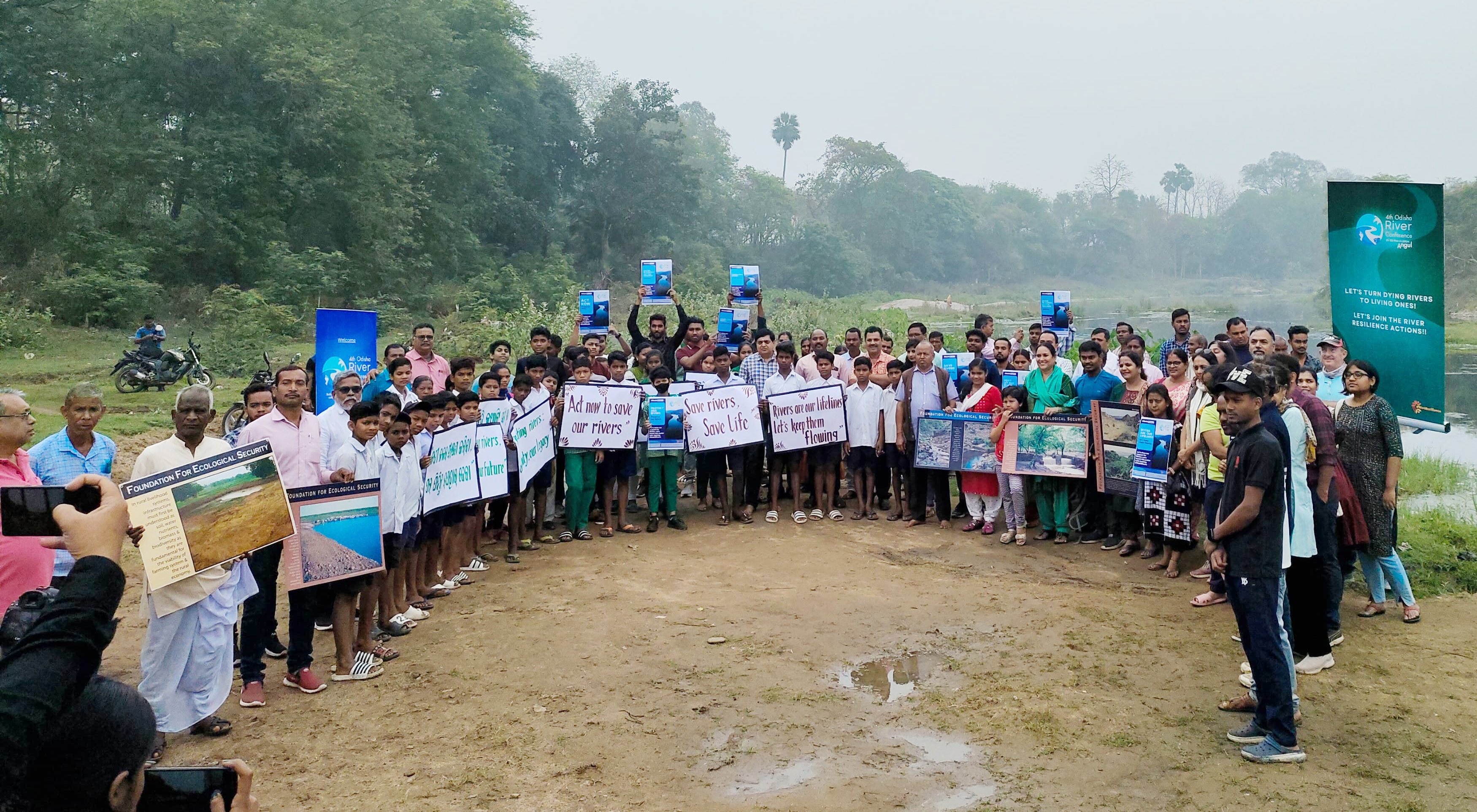
The 4th Odisha River Conference, held on 21-22 March 2024 at Angul, concluded with a resolve to increase river conservation education among all sections of society to help save our dying and decaying rivers. The conference, organised by Water Initiatives Odisha, Foundation for Ecological Security (FES), along with 53 partners from across the world, aligned with the International Day of Action for Rivers and World Water Day.
More than 150 participants from a cross-section of society participated in two days of intense deliberations that included two general sessions and five technical sessions emphasising the critical role of rivers and connected ecosystems such as forests, floodplains, grasslands, and others. The conference was inaugurated by veteran Sarvodaya leader Krishna Mohanty who emphasised in her address the importance of viewing rivers as living beings – vital entities deserving respect, nurture, and care.
“This time around, we emphasised increased participation of youths as this conference also strategised the next phase of actions to be taken by the Youth4Water campaign that was flagged off during the 3rd Odisha River Conference at Baripada in March 2019,” said Ranjan Panda, Convenor of Water Initiatives.
Swapnasri Sarangi, General Manager, FES, said that the conference had been a collective effort in the true sense. “We had 53 partners this time who are committed to partnering for a water-secure future for humans and other species at a time when climate change is impacting all of us in disastrous ways,” she said.

Bishakha Bhanja, a senior expert on water and women issues of the state, and chairperson of the conference organising committee said it was a unique conglomeration of people and institutions who were committed to the cause of conserving rivers by looking at those in an interconnected way and not as isolated ecosystems.
Shubha Kulkarni from the Living Rivers Foundation, Pune; Basudev ji from the Bundelkhand Sewa Sansthan, UP; Steve Lockett from the Mahseer Trust, UK; Anurag Gupta from WaterAid India; Dr. V. R. Haridas and Dr. Mukund Deshmukh from Caritas India; Prof. Nidhi Nagabhatla from the United Nations University, Brussels; Dr. Ripin Karla from the Westminster University, UK; Abhiir Bhalla, Youth Adviser to Commonwealth Human Ecology Foundation, UK; Dr. Bibhu Nayak from the TISS, Hyderabad; Ardhendu Chatterjee from the DRCSC, Kolkata; Rahul Sachdeva from the National Institute of Urban Affairs (NIUA); Namrata Kabra from Kubernein Initiative; Dayadra Mandal from Wetlands International South Asia; Anil Dhir from INTACH; Prof. Mrinal Chatterjee, IIMC; filmmaker Amrutendu Baral; senior journalist Asish Senapati; farmer leader Saroj Mohanty; and civil society leaders and experts such as Meena Das Mohapatra from FES; Sneha Mishra from Aaina; Bidyut Mohanty from SPREAD, Ajit Panda from Water Initiatives; Ruchismita Jagadev from CIRTD and Manas Mishra spoke along with many community leaders and youth representatives on different topics that highlighted the importance of rivers in our lives, livelihoods, cultures, economies, and geographies.
Almost all emphasised on working together in a collective approach to take river education to all sections of society and help engage more youths to the cause. The 4th Odisha Water Honors were given away during the conference by Chief Guest Krishna Mohanty and other dignitaries. While farmer leader Saroj Mohanty, who has extensively researched farmers’ issues, received the Odisha Jala Joddha Sammana 2024 in the individual category, the Budanpipali Community Forest Protection Committee from Kandhamal received the Ajira Bhagiratha Sammanna 2024 for their community level pioneering initiative to conserve forests and recharge water bodies.
The 1st Youth4Water ‘Water & Climate Impact Award’ was given to a local youth, Urmila Behera who has been consistently working at her gram panchayat to raise awareness and take actions around water and forest conservation. This award carries a cash prize of Rs. 10,000 given by the SAKSHI Handloom.

The Green Picnic Awards – Season 2, being given by Youth4Water and DALMA chain of restaurants as part of the Plastic-Free Picnic Challenge, were announced during the Conference. While MountXPlore from Odisha’s Bargarh received the first prize, the second and third prizes went to Interact Club of Zebar School for Children, Gujarat and Interact Club of the Laidlaw Memorial School and Junior College, Tamil Nadu, respectively. The awardees will receive Rs.10,000, Rs.7,500, and Rs.5,000 as prize money, respectively from DALMA chain of restaurants.
A film on rivers titled ‘Black is the new blue’ by Friedrich Ebert Stiftung and another film on Rivers & Cultures by students from IIMC were showcased at the conference. Youth participants actively participated in the conference and decided to strengthen the Youth4Water campaign further.
“Besides drawing attention to the current status of rivers in the state, all the speakers talked about the initiatives being taken to revive and restore them. They also spotlighted the interconnections among river health, forest health, rural and urban societies, and livelihood resilience,” said Swapnasri Sarangi.
On day 2 (March 22)), to celebrate World Water Day, a River Rally was organised at the banks of Lingara River, where experts and conference participants joined local school and college students to show love and respect to the rivers. Local youths decided to work at both individual and community levels to take up river cleanup and conservation initiatives through awareness of plastic and other pollutants, education on river commons, and forests.
“By fostering dialogue, awareness, and strategic planning across the two days, the River Conference aims to strengthen collaboration among different stakeholders for river conservation, livelihood resilience, and climate action in the state and beyond,” said Ranjan Panda.
He further said: “The space of rivers is shrinking in our minds, perceptions, dreams, societies, cultures, economies, and geographies. We must work together to change the fate of the rivers by engaging with almost all sections of society and institutions. This time around, the conference invited more youths to participate and interact with communities and experts so that they could lead the river conservation actions.”
/articles/river-conservation-vital-building-climate-resilience